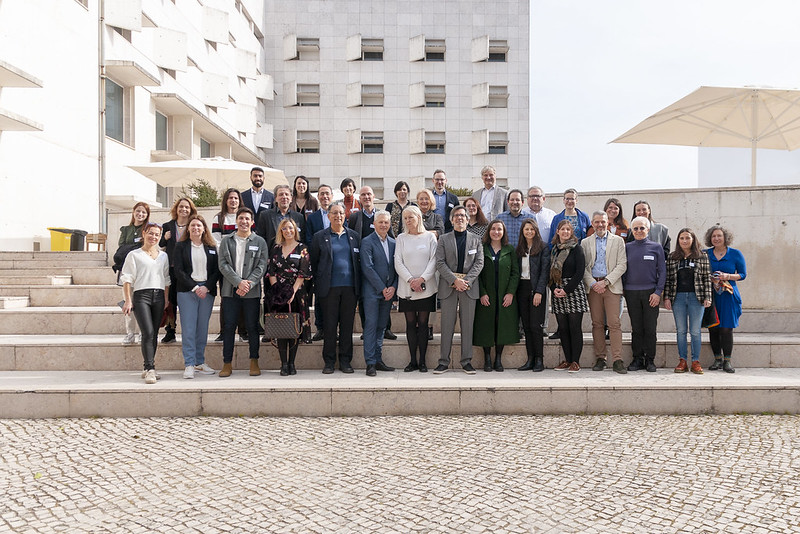27.04.2023
ISCTE Knowledge and Innovation Centre, together with 25 other European partners, launched the most recent European-funded project, “XpanDH: Expanding Digital Health through a pan-European EHRxF-based Ecosystem” in Lisbon, Portugal. The in-person gathering of research organisations, businesses and intergovernmental and multistakeholder associations marks the consortium’s grand undertaking to mobilise and build individuals and organisations’ capacity to create, adapt and explore the purposeful use of interoperable digital health solutions based on a shared adoption of the European Electronic Health Record Exchange format (EEHRxF).
On 15 – 16 February, the XpanDH consortium organised an in-person kick-off meeting in Lisbon (Portugal) to discuss how to begin executing the promising project. In line with the focus of the European Health Data Space on unleashing the full potential of health data in Europe, the 2-year project will concentrate on leveraging an established network of networks and a vibrant ecosystem to support the adoption of the European Electronic Health Record Exchange format.
XpanDH will trigger true and participatory involvement from all relevant end-users – from patient and caregivers to professionals and more – in the EEHRxF implementation and dissemination. Compounding this impact will be the consortium’s capacity to ensure the necessary flexibility and openness to manage potential changes and needs that arise from the co-creation process, to ensure real acceptance.
Helping Deliver a Sustainable and Scalable Interoperability Environment at an Opportune Moment in the European Union (EU)
The arrival of the XpanDH project comes at a unique time for the European Union.
Member States (MS) have taken various actions to set up the common groundwork for eHealth interoperability. Following the success of the established eHDSI and its “MyHealth@EU” services, as well as the Digital COVID Certificate, the EU can now use standards to define interoperable and cross-border services amongst MS. At the same time, the European Commission is proposing a regulation to set up the European Data Health Space, which aims to provide better digital access to personal health data; potentiate the data economy via a genuine single market for digital health services and products; and set up strict rules for the use of individuals’ non-identifiable health data per research, innovation and more. Finally, as part of the Communication on Digital Transformation of Health and Care (DTHC 2018), the European health record exchange format arose in 2018.
Yet, despite these advances, challenges remain. Large-scale adoption of interoperable solutions x\between healthcare provider (HCP) organisations inside or between MS await agreement on common definitions that could be applicable at both an intra- and inter-organisational level. Similarly, following the COVID-19 pandemic, there is a dire, growing need for European digital health actors to converge on familiar, usable and reliable tools for real interoperable services that enhance healthcare cooperation for better health and European healthcare solidarity.
This is where the 1.97M-euro project intervenes. XpanDH understands the current mise-en-scène as it relates to eHealth. It has made it its commitment to execute a “network-of-networks” approach that would ensure digital health actors find the motivation and support to help early adopters advance to the concrete use of EEHRxF-embedded digital health solutions. Through these means, health and care can count on added value, and Personal and European Health Data Spaces can grow in strength.
Taking Action to Empower End-Users to Receive and Maximise Health Data for Better Care
To achieve the aforementioned, XpanDH will embark on four undertakings.
These include establishing and sustaining a scalable public infrastructure for digital health innovation; demonstrating feasibility of real-life interoperable digital solutions for cross-border use by individuals, researchers, health services and the workforce; creating and fostering a Pan-European ecosystem of digital health; conceiving and validating a framework for enabling further exploitation of the public infrastructure for digital health innovation. Of special interest, the project will produce so-called X-bundles, an aggregation of interoperability assets that support the connection of health systems in different ways, based on EEHRxF specifications.
As XpanDH Coordinator Henrique Martins of ISCTE states “…the development of X-bundles will establish common ground for eHealth interoperability by using common international standards and formed connections to ensure that the exchange of health data takes place smoothly. It will benefit all European citizens who use MyHealth@EU services, which currently features prescription/eDispensation, patient summaries and, in the near future, laboratory reports, imageology and hospital discharge letters, as stated in EEHRxF specifications.”
Lastly, the consortium will thrive on past and ongoing eHealth interoperability projects and services, and particularly on the X-eHealth and DigitalHealthEurope project recommendations, through digital health data activism and strong patient engagement.
Together, the 26 digital health partners will bring the change much needed in the health data domain to ensure better care for all.

Follow XpanDH on Twitter and LinkedIn for continual information about the project.
Contact: Henrique Martins, Coordinator of XpanDH and Associate Professor at the Instituto Universitário de Lisboa. henrique.manuel.martins@iscte-iul.pt
